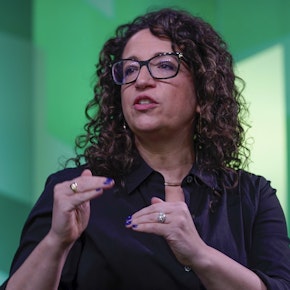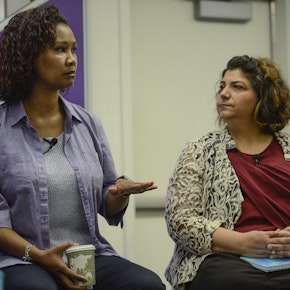Explore
Search results

Structural racism, reflected in uneven access to care, inequitable community conditions, and the wealth gap, drives persisting racial disparities in health. Unconscionable differences in life expectancy and the incidence of numerous diseases are the result. The systems and structures at the root of these inequities were created intentionally and need to be dismantled just...

In this new Aspen Ideas format, all attendees gather each morning to kick off the day by exploring a current issue of deep complexity. This year, the Supreme Court is once again considering the constitutionality of race-based affirmative action programs, and its ruling may have a profound impact on the makeup of America’s most selective colleges and universities. How sh...

How can we overcome our own biases and stop seeing the worst in others? Psychologists and bestselling authors Jennifer Eberhardt and Adam Grant, along with CBS News’ John Dickerson, use cutting-edge research and examples from their own lives to discuss whether there’s hope for our schools and workplaces to bring out the better angels of our nature.

Join Sal Khan as he shares the inspiring story of how he founded Khan Academy, a nonprofit organization that is now educating millions of people worldwide. While Khan Academy may be best known for math videos, today the organization offers free interactive practice exercises and articles in the humanities and sciences, as well as test prep for the SAT and LSAT that adapts...

In this season of campus activism around race, inclusion, speech, and privilege, how can US colleges best cultivate—and reimagine—civic leadership? And in an age that rewards "gold stars" and visible achievement, how can universities best cultivate character and an ethic of intrinsic purpose among leaders?

With students learning in more places and different ways than we have ever seen, the pace of change in education is dizzying. Join our panel of education experts in a discussion about what the classroom of the future will look like, how educational innovation can bridge divides, and how we can work together to get there. Presented by the Walton Family Foundation

If young adults need a college education so badly, why are recent college grads so disproportionately unemployed? Experts tell us that two-thirds of jobs in the US by 2020 will require post-secondary credentials of some sort. Ironically, the pace of change is such that identifying the jobs that will come available in five years is hard to predict, creating questions ab...

Far too many students in the United States and around the world face challenges when seeking a quality education; this untapped potential is a waste of societal and economic resources. In this session, education and civil society leaders will talk about their efforts to engage underserved and refugee youth, and their successes and failures in helping those youth overcome b...

Within our lifetimes, AI will, by design, begin to behave unpredictably, thinking and acting in ways which defy human logic. Big tech companies may be inadvertently building and enabling vast arrays of intelligent systems that don't share our motivations, desires, or hopes for the future of humanity. Is it too late to change course and realize a human-centered future for a...

Students and teachers have displayed remarkable courage in the face of overlapping traumas this past year. Building on that resilience and the new, innovative ways students and teachers stayed connected throughout the pandemic will be key as students return to school this fall. In this session, Dr. Priscilla Chan, co-founder and co-CEO of the Chan Zuckerberg Initiative (CZ...

Roughly one in four students choose business as their undergraduate major in the US, making business the most popular academic pursuit. While business majors excel in the post-graduation job market, some studies suggest humanities majors actually fare better over the course of their careers. How do we retain the liberal arts in the face of demand for business credentials?...

Americans now owe a staggering $1.5 trillion in student loan debt, according to Forbes. With growing online opportunities catered to self-taught learners and the ever-evolving digital nature of work in the modern world, do we still need to sit in classrooms to get a college education? Are companies and government institutions rethinking the long-standing requirement of a f...

Students today face a complex, economically competitive future. Yet in too many schools, they are missing a critical piece of their education. Our K-12 schools appropriately emphasize the rigorous academic skills students need to be ready for college and career. But now there is compelling evidence that we must complement the focus on academic achievement with development...

